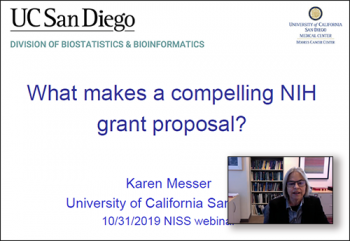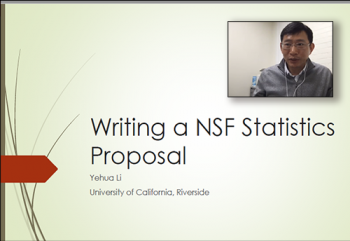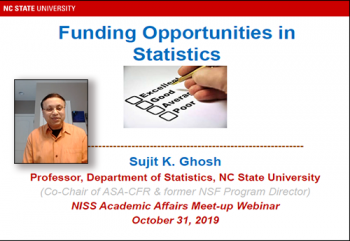


On October 31st, 2019 NISS Academic Affiliates committee hosted a webinar geared primarily towards faculty researchers who are in the process of or have been thinking about writing a grant. Grants provide you with the opportunity to extend your line of research, collaborate with other scientists and/or help provide you with another revenue stream to fund your efforts. But what are the keys to getting your ideas accepted? The NISS Academic Affiliates committee was very fortunate to bring together three speakers who have considerable experience as both principal investigators and grant reviewers to provide their own personal insights and advice regarding this process. (Please note: all of the speakers were speaking from their own personal perspective and not as an official spokesperson of any funding agency.)
Dr. Karen Messer, Professor and Chief of the Division of Biostatistics and Bioinformatics in the Department of Family and Preventive Medicine at UC San Diego School of Medicine was the first speaker. As current Chair of the NIH Biostatistical Methods and Research Design (BMRD) Study Section she has been involved in the submission and review of grant applications that seek to advance statistical and mathematical techniques and technologies applicable to the experimental design and analysis of data in biomedical, behavioral, and social science research. Her remarks focused on the two different and separate reviewing processes involved in the submission of grants to the National Institute of Health (NIH). Reviews are administered by the Center for Scientific Review within NIH. Applications first are reviewed within a Study Section, where grants receive scientific review by peers within the specific field of interest, using a very formalized and structured process which results in a score. The second review takes place within an institute or center that is disease focused, and this is where the funding decisions are made, taking the score into account. Her talk was loaded with advice regarding both of these reviewing processes, the NIH in general, a host of resources as well as key elements to consider when you are ready to write your application. One of these included a suggestions to become a reviewer yourself. What better way to learn about grants than to become a reviewer!
The second speaker was Dr. Yehua Li. Dr. Li is Professor in the Department of Statistics at UC Riverside. He has been the Principal Investigator of grants from the National Science Foundation (NSF) and NIH, and was the recipient of a NSF CAREER award in 2012. He has also participated on multiple grant proposal review panels for national and international funding agencies. Dr. Li's remarks focused on proposals for NSF within the Division of Mathematical Sciences where there are many grant opportunities with a statistical focus. He started off by providing an overall structure, the types of research that NSF funds as well as what a NSF grant could mean to junior faculty. Dr. Li also provides loads of personal advice regarding how to navigate the NSF proposal process regarding the content and writing focus of an application, budgetary considerations as well as timelines. Final comments included don't be afraid to branch out and collaborate with others as well as the importantace of persistence!
Dr. Sujit Ghosh, is a Professor of Statistics at NC State University and served as the Program Director in the Division of Mathematical Sciences (DMS) at NSF in 2013-2014 and is currently the co-Chair of the American Statistical Association (ASA) Committee on Funded Research. While the first two speakers focused on grant proposals with NIH and NSF, Dr. Ghosh focused on grant opportunities from other sources. Most importantly, he reviewed the role that the ASA plays in providing resources for statisticians interested in grant sources. In particular he described the some of the important resources on the ASA website; External Funding Sources: Federal agencies and other organizations offering funding. Individuals might also want to join the ASA Community - Funding Opportunities. In addition, he provided the following useful links within his slides:
Upcoming Deadlines at NSF-DMS: https://www.nsf.gov/funding/pgm_list.jsp?org=DMS&ord=date
All About Grants Podcasts (NIH): https://grants.nih.gov/news/virtual-learning/podcasts.htm
Funding Opportunities: Better Statistical Participation is Needed Across Collaborative Science: https://magazine.amstat.org/blog/2015/12/01/funding-opportunities/
For those of you that could not attend the webinar live, or for review purposes, below is a recording of the event and below this are included the slides from each of the speakers.
There were nearly 100 attendees at this event!
Keep your eyes open for the next NISS Academic Webinar! NISS Affiliates will automatically be informed.
Speaker Slides
NISS_grant_webinar_messer.pdf
NISS_grant_webinar_li.pdf
NISS_grant_webinar_ghosh.pdf
